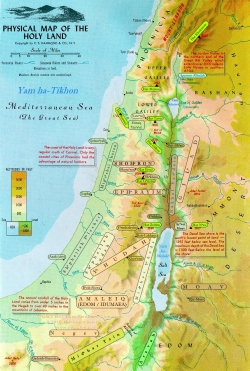wa-Yishelakh 1st Eve (Mo•tzâ•eiꞋ Shab•âtꞋ Beginning Week)
After Lâ•vânꞋ and Ya•a•qovꞋ had parted company,

Preparations For Reconciling With Ei•sauꞋ
 250x364.jpg) |
 0350x263.jpg) |
Ya•a•qovꞋ sent a delegation of his ranch-hand warrior foremen ahead as a delegation of ma•lâkh•imꞋ to Ei•sauꞋ, in his land of Ë•dōmꞋ – Har Sei•irꞋ. He ordered them: "Say this to a•don•iꞋ Ei•sauꞋ: 'Your servant, Ya•a•qovꞋ, conveys to you, "I've been living with Lâ•vânꞋ, staying with him. I now have oxes and donkeys, flocks and herds as well as a servant and a maid. I've sent these delegates to advise a•don•iꞋ in hopes of finding favor in your eyes." ' "
Recall that these are twin brothers—the elder Ei•sauꞋ, from whom the younger Ya•a•qovꞋ had, 20 years earlier, fled for his life after Ei•sauꞋ disvalued the family theology and bᵊrâkh•âhꞋ and then went on to disvalue his right to the eldest son's double-portion of inheritance from his father (Yi•tzᵊkhâqꞋ), trading it for a heaping plate of â•domꞋ beans. Consequently, both of his birthrights thereafter accrued to Ya•a•qovꞋ. Though each of these resulted from Ei•sauꞋ's own apostasy, he blame-shifted responsibility onto his younger twin.
 |
As Ya•a•qovꞋ traveled south from Nᵊhar Yar•mukhꞋ and âÌÇìÀòÅã toward NaꞋkhal éÇáÉÌ÷, he increasingly dreaded how his older twin brother would respond to his return.
Ei•sauꞋ, in turn, was doubtless also experiencing préjà vu1 regarding his younger twin's return. Ya•a•qovꞋ had, already, proven the superior deal-maker – twice over. Now, his younger twin brother had returned with obvious wealth and power.
While Ya•a•qovꞋ claimed to have only one servant and one maid, the presence of his envoy of warrior ranch foremen made plain that Ya•a•qovꞋ was not merely Ei•sauꞋ's servant as he fawned, nor a defenseless rancher with a couple of cowboy ranch hands as two house servants would suggest.
To Ei•sauꞋ, this appeared to be yet another deception. Clearly, Ya•a•qovꞋ was, like Avᵊrâ•hâmꞋ and Yi•tzᵊkhâqꞋ before him, a home-seeking empire to be reckoned with, and he clearly intended to return to his indigenous homeland. Did that include taking the land of Sei•irꞋ from Ei•sauꞋ like he did the family bᵊrâkh•âhꞋ and his double-portion inheritance that had been his as the eldest twin? No less worried than his younger twin, Ei•sauꞋ ordered a battalion of 400 of his ish hunter-warriors to show Ya•a•qovꞋ that he intended to, and was capable of, defending his land of Sei•irꞋ.
Ya•a•qovꞋ's Ma•lâkh•imꞋ Hurried Back To Warn Him:
Ei•sauꞋ Comes With a Battalion of His ish Warriors
Ya•a•qovꞋ was instinctively terrified by this overt threat from his elder twin—from whom he'd already fled for his life once, 20 years earlier. The account doesn't tell us what, if any, intelligence Ya•a•qovꞋ had regarding how many warriors Ei•sauꞋ had kept at home to defend his capital. We know only that Ya•a•qovꞋ strategized that he felt he could repel Ei•sauꞋ's battalion of ish hunter-warriors with just half of his own ranch-hand warriors. If his force failed to repel Ei•sauꞋ's battalion, however, Ya•a•qovꞋ opted to escape and retreat rather than commit all of his forces in a life or death struggle where Ei•sauꞋ, too, would call up all of his forces and one of them would be completely eradicated and cease to exist.
So Ya•a•qovꞋ divided his forces, herds and property into two camps. One group would cross to the south bank of NaꞋkhal éÇáÉÌ÷, prepared to fight if necessary; while the other half remained a safe distance behind on the north bank, where they could retreat quickly, returning northward, if a battle ensued and went badly.

Optional parental preparation:
- Note 1 – A portmanteau play on words of the French phrase: a portent, especially a foreboding or dread feeling, that something you've seen before is about to recur as a déjà vu moment.

Questions you might anticipate that your child might raise and be prepared to discuss:
- What does it mean to fawn?
- What's an inheritance? A birthright?
Google+ registered author & publisher

